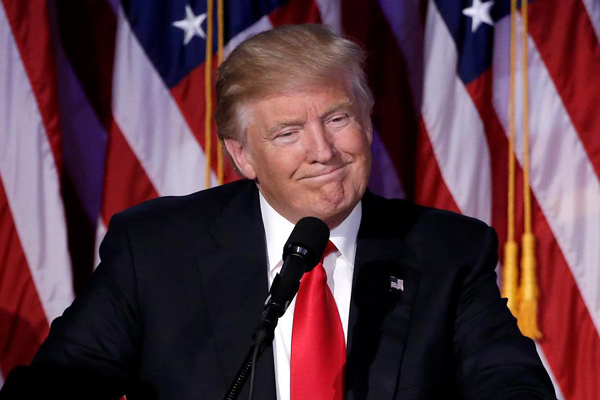 |
|
US President-elect Donald Trump speaks at election night rally in Manhattan, New York, US, November 9, 2016. [Photo/Agencies] |
The world is still wondering what will be the impact of Donald Trump's election as US president on different countries and regions. But going by Trump's remarks during the presidential campaign, he may handle some of the world's key security issues differently from the Barack Obama administration. Under Trump, the United States may focus more on domestic issues and pay less attention to foreign policy.
If that were to happen, the US would have to make major adjustments to its global resource allocation, both on the economic and military fronts.
To honor his promise to improve domestic infrastructure, create 25 million jobs in the US and fight terrorism in a more radical way, Trump may choose to spend less on projecting US power in the Asia-Pacific region and use the funds and resources so saved to fight terrorism in the Middle East and address domestic woes. That will mean a major departure from the Obama administration that has painstakingly pushed its "pivot to Asia" strategy by focusing 60 percent of its military strength on the Asia-Pacific while phasing out its military presence in the Middle East.
For Asia-Pacific countries, especially Japan and the Republic of Korea, they still don't know what to expect from the next US administration as Trump has said during the presidential campaign that Washington's allies in the region must do more to defend themselves and contribute more to maintain US military presence in their territories.
Yet the US' strategic contraction globally will not be as bad as some fear. On the contrary, it could help right the wrongs the US has done in recent years in its "war on terror" and military maneuverings in the Asia-Pacific.
The Obama administration's reluctance to actively fight terrorists and extremists, especially the Islamic State terrorist group in the Middle East, has been widely criticized. And the US' interference policy in the region, coupled with the covert arming of rebel forces to orchestrate a regime change in countries like Libya and Syria, is largely to blame for the rise in terrorism and extremism in the region. Hence, the incoming Trump administration should adopt a harder line on terrorism and clean up the mess the US has helped create in the Middle East.